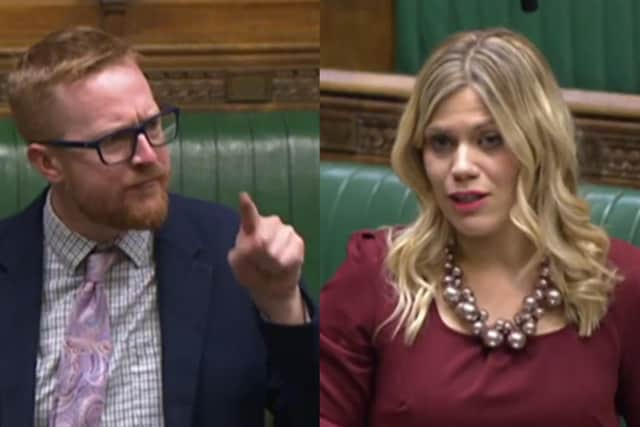Sheffield MP Miriam Cates responds to ‘dog whistle transphobia’ row after Gender Reform Bill debate
and live on Freeview channel 276
The Conservative MP for Penistone and Stocksbridge raised safeguarding concerns about Scotland’s Gender Recognition Reform Bill, which would make it easier for trans people to get a Gender Recognition Certificate (GRC) in the House of Commons last week.
It came shortly after the UK government used a Section 35 order under the Scotland Act to block the bill from becoming law – which Ms Cates said it was “absolutely right” to do.
Advertisement
Hide AdAdvertisement
Hide AdOthers have disagreed, including Shona Robison, SNP member of parliament and cabinet secretary for social justice, who wrote in The Guardian that the government’s veto was “shameless” and harmful to trans people.


She added the long-awaited improvements to the recognition process were long proposed, consulted on and debated.
Ms Cates said the bill would have made it “vastly easier” for predators to exploit loopholes to gain access to children and women.
She added, reducing the age limit for sex changes to 16 was too young because people could not assess the long-term implications for their welfare at that age.
Advertisement
Hide AdAdvertisement
Hide AdMs Cates described how she was recently frightened when a “man dressed as a woman” walked into the toilets where she was alone, stood behind her, stared at her in the mirror and looked into her eyes.
“I have no idea if he intended me any harm but my instinct as a woman was to be frightened because unlike almost any other species women are far less powerful than men, we can’t defend ourselves – it’s a fact – the difference in strength between men and women is phenomenal,” she said. “That is why we have separate sex categories for sports.
“Women have evolved to be wary of men in intimate spaces, that is why we have single sex spaces. They must continue to exist for the safety and privacy of women, this threatens that social contract.”
She added: “You cannot change your sex any more than you can change your place of birth or who your parents are. I fully understand the complex arguments involved in this and we should treat it with compassion but if the law is not based on fact then how can we trust the law?”
Advertisement
Hide AdAdvertisement
Hide AdLloyd Russell-Moyle, Labour Brighton MP, said it was “one of the worst transphobic dog whistle speeches” he had heard.
He shouted at her: “The idea of linking trans people with predators is disgusting and you should be ashamed.”
Mr Russell-Moyle was told to calm down and moderate his language by the deputy speaker.
He was accused of moving to sit close and stare at Ms Cates in order to intimidate her following the outburst but he later said he had “no concept” this made anyone feel awkward.
Reaction
Advertisement
Hide AdAdvertisement
Hide AdLGBTQ+ publication PinkNews backed what Mr Russell-Moyle said, calling the speech “awful bigotry”.
Several politicians from various parties whose views on trans issues have caused controversy publicly supported Ms Cates.
Labour MP Rosie Duffield defended her in an article she wrote for UnHerd saying Labour had a women problem and former Green Party deputy leader Shahrar Ali said Mr Russell-Moyle’s reaction showed misogyny was “alive and kicking in the name of authoritarian virtue signalling”.
Debbie Hayton, political activist, tweeted: “As a trans person, I just wish Lloyd Russell-Moyle would stop shouting, stop jabbing his finger, and start listening and thinking.
Advertisement
Hide AdAdvertisement
Hide Ad“Miriam Cates is no transphobe; she cares about children, as do I.”
Responding to questions on the debate in general, Emily Thornberry, Labour’s shadow Attorney General, said: “This was not a debate that was frankly Parliament’s finest hour in my view.
“On the one hand, we had the Conservatives wanting to stoke some sort of culture wars and on the other hand, we had the Scottish nationalists deciding that they were going to sort of fight the battle of nationalism again and that’s what it was all about.
“The last thing that anyone was thinking about, in my view, were the very marginalised people, those people who are some of the most vulnerable in our society, who are trans people.”
Apology
Advertisement
Hide AdAdvertisement
Hide AdMr Russell-Moyle later wrote to Ms Cates and apologised to the deputy speaker for his behaviour, saying he “failed to control his passion”.
He said: “I should have expressed my deep disagreement, with what I believe is an abhorrent view, in a more appropriate way.”
Miriam Cates responds
Speaking after the debate, Ms Cates said: “It’s incredibly important that people are able to raise legitimate concerns about women’s rights and children’s safety without the threat of intimidation.
“There are very real problems with the Scottish Gender Recognition Reform Bill that would open up loopholes that could easily be exploited by those who seek to harm women or children.
Advertisement
Hide AdAdvertisement
Hide Ad“Whilst we must always be compassionate to those people who are experiencing gender dysphoria, we also have to base our law on reality and science, and that includes recognising the facts of biological sex.
“I’m concerned that the response in Parliament to my very reasonable points around safeguarding are reflective of a wider intolerance that puts women off from speaking out about their safety.”